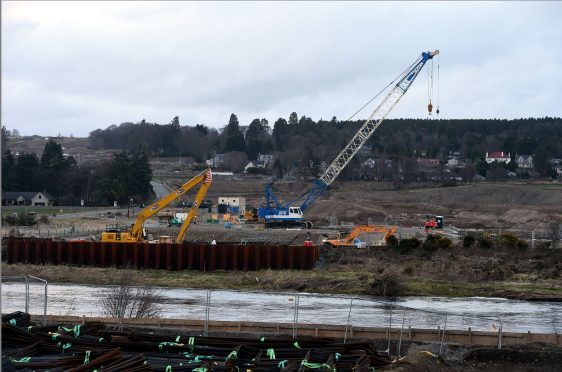A leading biologist, living close to Aberdeen’s long-awaited AWPR, has urged Scotland’s environmental watchdog to investigate further into “wicked” pollution caused by the project.
Professor Anthony Hawkins is a specialist in the effects that noise has on fish and his advice on conservation issues has been sought by governments all over the world.
The former head of the Marine Laboratory in Aberdeen, who lives close to the river in Blairs, called on the Scottish Environmental Protection Agency (SEPA) to investigate “the pollution seeping through the area’s waterways”.
In December, the agency launched an investigation into the AWPR, following complaints of pollution incidents in various tributaries of the River Dee and the River Don.
The investigation is still ongoing.
Professor Hawkins, who last year published five scientific papers, said: “What distresses me is that SEPA themselves didn’t notice there was a problem – local people had to draw it to their attention.
“Yet at the public inquiry for the AWPR, it was made clear there would be monitoring and mitigation measures put in place to ensure there wasn’t this kind of pollution.
“I’ve gone to have a look at the Blaikiewell burn, but it really does look like soup.
“A couple of days after it was reported, you could hardly move for SEPA people examining the burns, but I haven’t seen any SEPA officials since then, and I think they need to keep an eye on things.
“The Dee is one of the few remaining rivers in Europe that still has freshwater pearl mussels, and to be destroying their habitat like this really is wicked.”
In January, SEPA issued an enforcement notice in a bid to protect freshwater pearl mussels and salmon in the Dee.
Transport Scotland said previously: “Our officials continue to work closely with other funding partners, Aberdeen City and Aberdeenshire Councils, and project contractors to address the concerns of local residents.
“All funding partners in the AWPR project take their environmental duties very seriously.
“We will continue to work with the contractor on an ongoing basis to ensure any impacts are minimised.”
Andy Rosie, SEPA’s head of operations for the north of Scotland said at the start of the investigation in December: “SEPA has significant concerns that construction activity on the AWPR poses an ongoing risk of pollution and has resulted in environmental impacts to the water environment.
“An enforcement notice has therefore been issued to the company involved today which will require urgent action to be taken on the pollution prevention measures necessary for protection of local watercourses in the vicinity of Cleanhill Wood, near Burnhead.
“These tributaries flow into the River Dee; designated as a special habitat for both salmonid fish and fresh water pearl mussels, which rely on a delicate ecosystem to feed and spawn.
“The erosion of silt from the construction site poses a risk to the quality of the water, and can settle out onto the bed of the rivers and streams, blanketing and damaging aquatic animals and plants.
“We are requiring the contractor responsible to take immediate and effective action to stop silt pollution entering and contaminating the local watercourses surrounding the AWPR site. Our officers will be monitoring progress closely over the coming months, and will not hesitate to take further enforcement action if necessary to prevent further pollution.”
